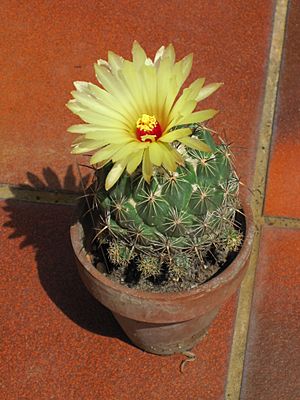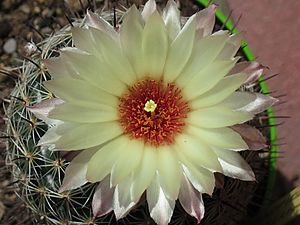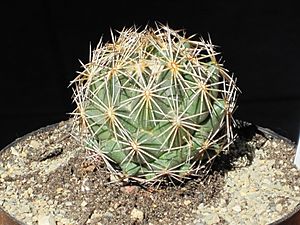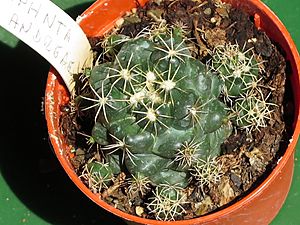Coryphantha facts for kids
Quick facts for kids Coryphantha |
|
|---|---|
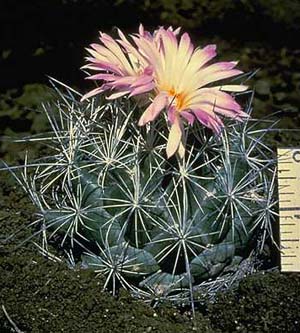 |
|
| Coryphantha ramillosa | |
| Scientific classification | |
| Kingdom: | |
| (unranked): | |
| (unranked): | |
| (unranked): | |
| Order: | |
| Family: | |
| Subfamily: | |
| Tribe: |
Cacteae
|
| Genus: |
Coryphantha
(Engelm.) Lem.
|
| Species | |
|
|
Coryphantha (say: Koh-ree-FAN-thuh), also known as the beehive cactus, is a group of small to medium-sized cacti. Their name comes from Greek words meaning "flowering on the top." These cacti can be round or shaped like columns.
You can find Coryphantha cacti growing naturally in dry areas. They live in Central America, Mexico, and parts of the United States. This includes Arizona, New Mexico, western Texas, and even up into Montana. With many different types, Coryphantha is one of the biggest groups of cacti. There are 57 known species (types) and 20 subspecies (smaller groups within a species).
Contents
What Makes Coryphantha Special?
There are four main things that help scientists tell Coryphantha cacti apart from other cacti.
- No Ribs, Just Bumps: Their bodies don't have long ridges like some cacti. Instead, they have many small bumps called tubercles.
- Flowers on Top: The flowers of these cacti grow right at the very top of the plant. This is where the plant is actively growing.
- Special Bumps: Each bump where a flower grows has three parts. It has a spiny area called an areole, a small groove, and a part called an axil. The groove is very important; if it's missing, it's not a Coryphantha.
- Net-Like Seeds: The outer covering of their seeds looks like a tiny net.
Coryphantha cacti can change a lot in how they look as they grow older. Even adult plants might or might not have a central spine (a sharp point in the middle of a cluster of spines).
How Coryphantha Got Its Name
The name Coryphantha was first used in 1856 by a scientist named George Engelmann. He first called it a subgenus, which is a smaller group within a larger genus. Later, in 1868, another scientist named Charles Antoine Lemaire decided it should be its own genus. Before this, all Coryphantha plants were thought to be part of the Mammillaria cactus group.
Types of Coryphantha Cacti
There are many different species of Coryphantha. Here are some of them:
- Coryphantha calipensis
- Coryphantha calochlora
- Coryphantha clavata
- Coryphantha compacta
- Coryphantha cornifera
- Coryphantha delaetiana
- Coryphantha delicata
- Coryphantha difficilis
- Coryphantha durangensis
- Coryphantha echinoidea
- Coryphantha echinus
- Coryphantha elephantidens
- Coryphantha erecta
- Coryphantha georgii
- Coryphantha glanduligera
- Coryphantha glassii
- Coryphantha gracilis
- Coryphantha grata
- Coryphantha guerkeana
- Coryphantha hintoniorum
- Coryphantha indensis
- Coryphantha jalpanensis
- Coryphantha kracikii
- Coryphantha longicornis
- Coryphantha macromeris
- Coryphantha maiz-tablasensis
- Coryphantha maliterrarum
- Coryphantha melleospina
- Coryphantha neglecta
- Coryphantha nickelsiae
- Coryphantha octacantha
- Coryphantha odorata
- Coryphantha ottonis
- Coryphantha pallida
- Coryphantha poselgeriana
- Coryphantha potosiana
- Coryphantha pseudoechinus
- Coryphantha pseudonickelsiae
- Coryphantha pseudoradians
- Coryphantha pulleineana
- Coryphantha pusilliflora
- Coryphantha pycnacantha
- Coryphantha radians
- Coryphantha ramillosa
- Coryphantha recurvata
- Coryphantha reduncispina
- Coryphantha retusa
- Coryphantha robustispina
- Coryphantha salinensis
- Coryphantha sulcata
- Coryphantha sulcolanata
- Coryphantha tripugionacantha
- Coryphantha unicornis
- Coryphantha vaupeliana
- Coryphantha vogtherriana
- Coryphantha werdermannii
- Coryphantha wohlschlageri
Other Names for Coryphantha
Sometimes, plants get different scientific names over time. This happens as scientists learn more about them. The Coryphantha genus has had a few other names in the past. Some of these names are still considered valid, while others are not.
Related Cacti Groups
Scientists sometimes move plants from one group to another. This happens when they discover new information about how plants are related. For example, some Coryphantha cacti were once placed in other groups. The type of Coryphantha called C. sulcata was first named Mammillaria sulcata.
On the other hand, some cacti that were once called Coryphantha are now in different groups. For instance, Escobaria vivipara used to be known as Coryphantha vivipara.
See also
 In Spanish: Coryphantha para niños
In Spanish: Coryphantha para niños
 | Tommie Smith |
 | Simone Manuel |
 | Shani Davis |
 | Simone Biles |
 | Alice Coachman |


